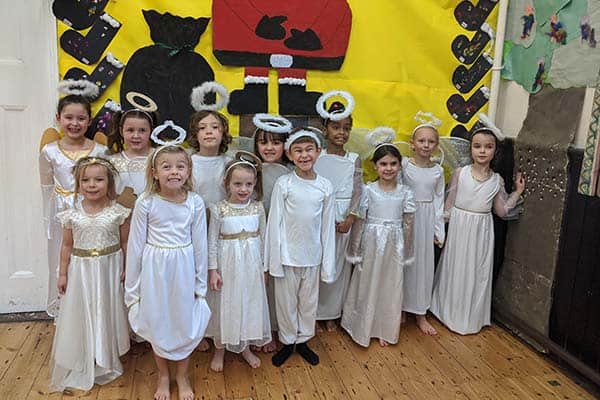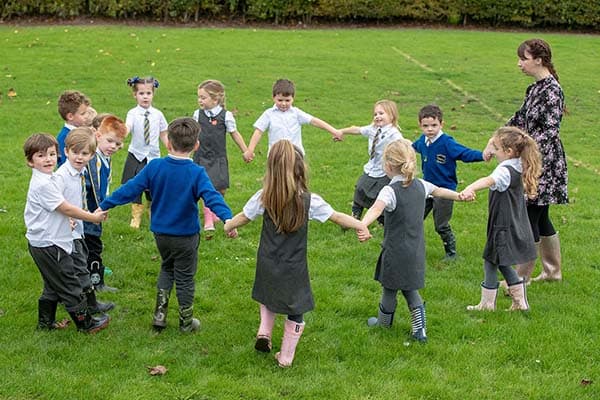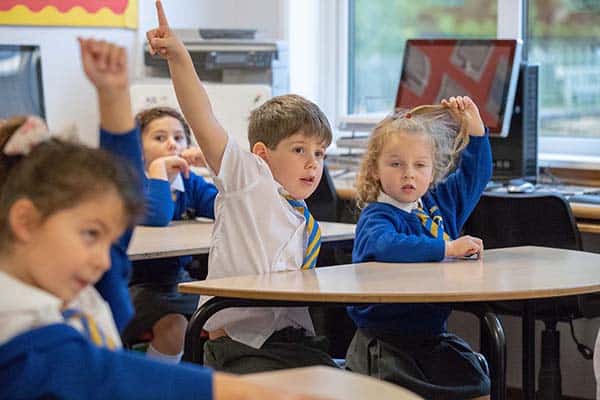Pupils try their best to follow the school’s behaviour code of ‘ready, respectful, safe’ in everything they do. They understand how this helps them to learn and be kind to each other. Social times are calm and friendly.
Ofsted inspection report 2025
From vision to behaviour
This isn’t a page about our behaviour policy, though you can find that policy here. This is about the way in which we take our vision and make it come alive as we live and learn together. Here’s our vision:
We are inspired to be a vibrant, joyful community in which we know and love one another, leading together and growing together by:
- Appreciating everyone and everything around us
- Making one another feel safe
- Sharing, so no one feels left out
- Living well together in love
- Moving forward together in hope
We try to be a school which feels like an extended family. We’re a small school, so that helps; but we’re also a school in which the atmosphere, the quality of relationships, and the love and respect people have for one another is really important. We believe that people learn best where they feel safe, welcomed, and heard.
In line with our school vision and values, we never draw a hard line between children and adults. At Bayford children learn to take responsibility for their own behaviour and also to care for others. Pupil voice is strong with older children leading the forum meetings and sharing in the interview process for new staff. A number of children are also trained to be play-leaders, running games and activities for their fellow pupils during playtimes and lunchtimes. Children also plan and lead worship in school, and take on roles like environment monitor. All the pupil ‘jobs’ are advertised and children apply for them.
We’re not saying we always get it right. We’re not saying that nothing ever goes wrong. What we are saying is that we try very hard to respond to challenges with compassion, understanding, and tolerance. We all try to look after one another. If you have any concerns about behaviour, bullying, or anything else which might be making any child or adult in our community feel anxious, scared, unvalued, or not heard, please talk to us as soon as possible. You can find out more information on our ‘raising a concern’ page.

Relationships across the school are warm and inclusive, creating a strong sense of community where all feel
SIAMS inspection report 2025
welcomed and valued.

Positive principles
We really believe in our vision for the school community, so in all that we do, we strive to share, encourage, and demonstrate positive values with our children, in order that they understand them and strive to live by them. We have a school code of behaviour for the whole school community, not just the children, because that’s what our vision requires. We take inspiration from a book by Paul Dix called When the adults change everything changes.
We believe it’s our duty to promote and encourage positive behaviour, not just react to that which is unacceptable.
We believe that when a child demonstrates unacceptable behaviour, it’s the behaviour which is unacceptable never the child.
To live out our vision we teach and model pro-social behaviour through our core Christian values and behaviour code.
Core values:
- courage
- appreciation
- respect
- peace
- responsibility
- love
Our code of behaviour:
- Ready
- Respectful
- Safe
Bayford is a happy, pleasant, secure and stimulating learning environment where everyone will be encouraged and inspired to do their very best. We believe that high-quality teaching promotes effective learning and good behaviour. Our emphasis will be on recognising and celebrating effort and success, so that all pupils feel valued. We will teach pupils to take responsibility for their own actions, to understand the consequences of their choices and to become responsible citizens for the future. We will adopt a zero-tolerance approach to bullying, racism and all other forms of discrimination by adults or pupils, and any such incidents will be dealt with promptly and firmly.
Policies and practice
It is a government requirement that all schools have an anti-bullying policy. We have one and you can read it by following the link below.
Bullying is wrong and damages individual children. We therefore do all we can to prevent it, by developing a school ethos in which bullying is regarded as unacceptable. Our vision for our school has no place for bullying.
We aim to promote a safe and secure environment where all can learn without anxiety, and measures are in place to reduce the likelihood of bullying.
We aim to make all those connected with the school aware of our opposition to bullying, and we make clear each person’s responsibilities with regard to the eradication of bullying in our school.
The policy aims to produce a consistent school response to any bullying incidents that may occur.
The anti-bullying policy sits in the wider context of our approach to behaviour and the process by which, in exceptional circumstances, we would handle an exclusion.
As it aligns well with our vision and values, we follow the Therapeutic Thinking approach to managing behaviour, which emphasises the importance of consistency and teaching internal, rather than imposing external, discipline. It focuses on care and control, not punishment. It uses techniques to de-escalate a situation before a crisis occurs and, where a crisis does occur, it adopts techniques to reduce the risk of harm. Our behaviour policy supports these principles.
We recognise that if we want to know and appreciate one another, and make everyone who is part of our community feel safe, we need to ensure that personal development and wellbeing are taken as seriously as academic achievement. We also recognise the need to prepare our children for life outside and beyond our school in which they will meet people from a wide range of backgrounds and with very different life experiences, cultures and faiths. To play our part in building a society in which we can all live well together in love, we work hard to ensure that spiritual, moral, social, and cultural development (SMSC) is at the heart of everything we do.

This page was last updated on 9th July 2025
